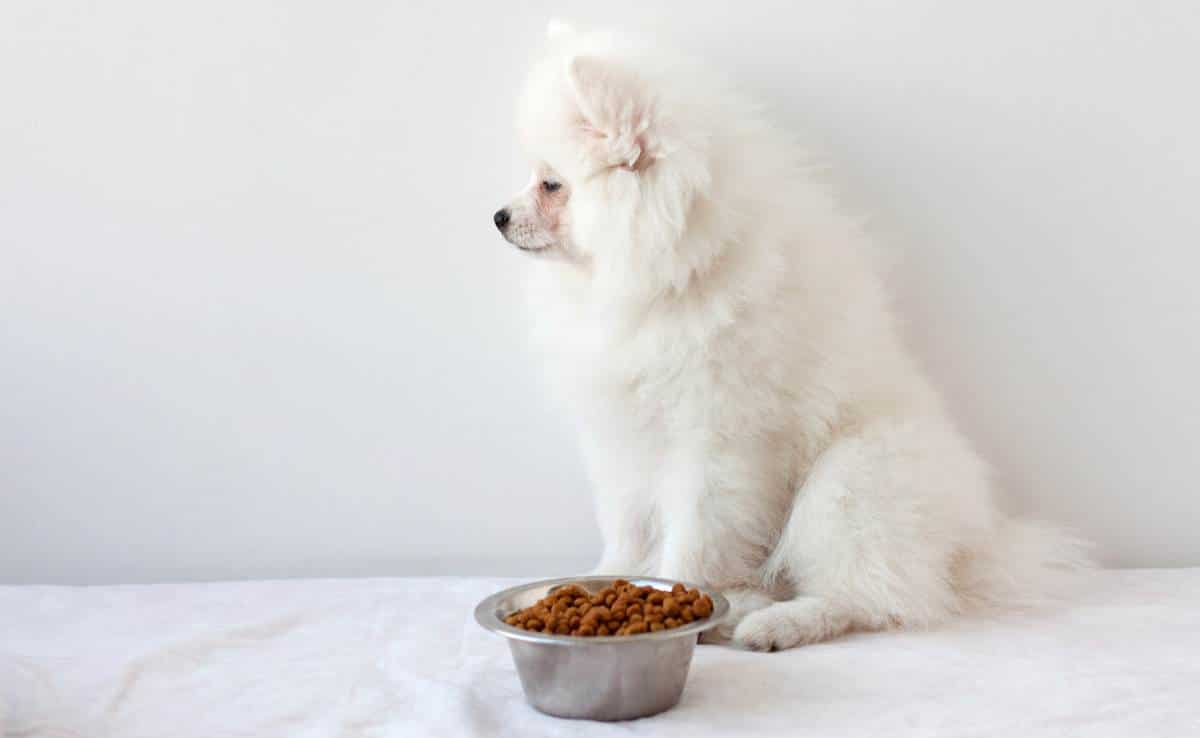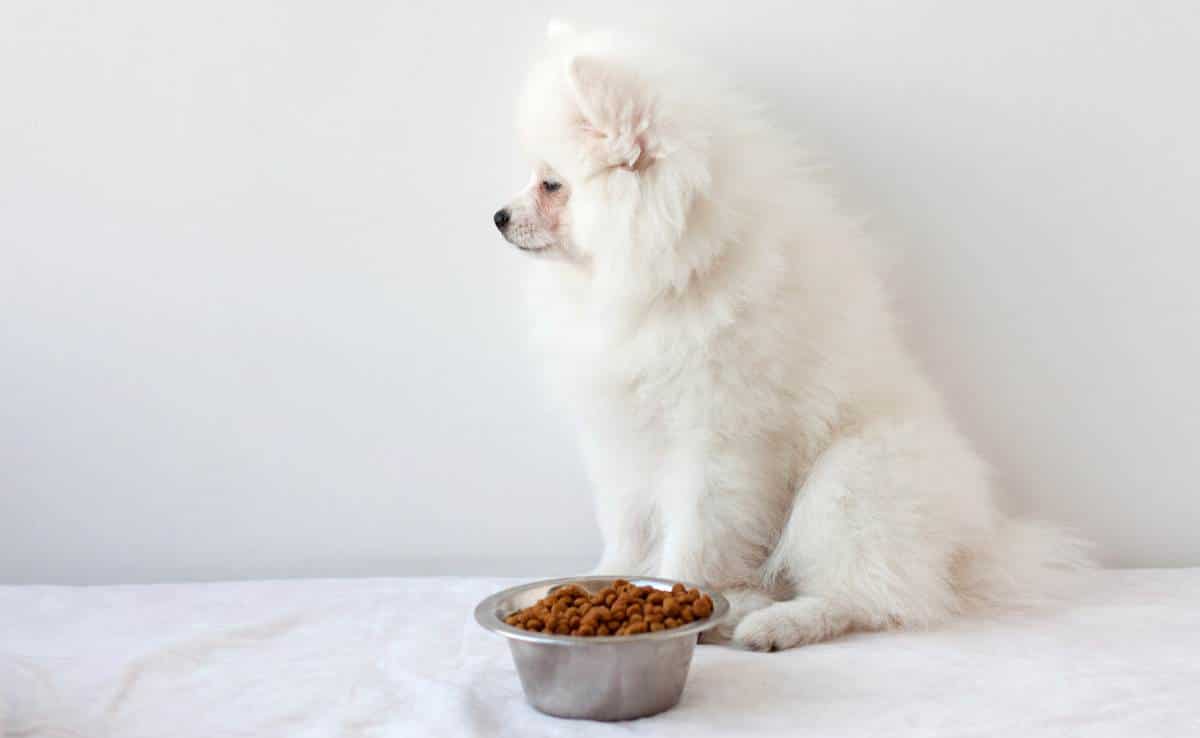
To keep the lights on, we receive affiliate commissions via some of our links. Our review process.

Many dogs go through a period of losing their appetite and refusing to eat. Naturally, this is a major concern for us dog owners. Just how long can dogs go without food or water? If your furry friend isn’t eating or drinking, we give you tips on how to get her the sustenance she needs and when it’s time to contact your veterinarian. We also explore the various reasons why your pup isn’t eating or drinking if you’re not sure what’s going on.
How Many Days Can A Dog Go Without Eating?
Contents
Healthy adult dogs can go anywhere from three to five days without food as long as they’re still drinking water. But that doesn’t mean you should wait that long to contact your veterinarian. If your pup has gone longer than 48 hours without eating anything, you should call your vet. Also, keep in mind that dogs who have underlying health conditions or are pregnant or nursing may not be able to survive as long without food.
Expert Tip: If your dog is usually a good eater but suddenly stops eating altogether, this could signal a serious medical condition, such as an intestinal blockage. So, seek vet care as soon as possible.
How Long Can A Puppy Go Without Eating?
Puppies can’t last as long without food as adult dogs because they don’t have any fat reserves to fuel their growing bodies. But how long puppies can go without eating depends on the age and breed. Puppies younger than eight weeks shouldn’t go more than five hours without eating. Generally, puppies over two months old can’t go longer than 12 hours without food.
Take note if you have a toy breed. Fasting can be particularly serious for toy breeds, especially when they’re puppies. Toy breeds, such as Chihuahuas, Yorkshire Terriers, Maltese, and Pomeranians, are prone to hypoglycemia, a drop in blood sugar. These puppies can face life-threatening complications if they go too long without food.
How Long Can A Dog Go Without Food And Water?
What if your pup has stopped drinking water? Like humans, our canine sidekicks can’t survive as long without water versus no food. But dogs are exceptionally prone to dehydration and can become severely dehydrated in as little as 24 hours. And puppies are even more susceptible to dehydration. Signs include:
- Panting
- Lethargy
- Dry nose
- Dry, sticky gums
- Loss of appetite
- Loss of skin elasticity
- Thick saliva
- Eyes looking dry and sunken
- Vomiting with or without diarrhea
If you notice these symptoms, call your vet immediately. Severe dehydration can be life-threatening because it causes organs such as the liver, kidneys, and heart to shut down.
Reasons Dogs Stop Eating Or Drinking
There are so many reasons a dog stops eating or drinking water. And some causes may be more obvious than others. Fortunately, this is usually a temporary situation that often resolves on its own. However, if your pup has gone more than 24 hours without drinking anything or over 48 hours without food, it’s important for you to seek vet care for treatment and for a diagnosis of any health problem that may be causing your pup’s anorexia (food refusal).
Some of the most common reasons dogs stop eating or drinking include:
- Illness: Anything from an upset stomach or intestinal parasites to serious health conditions, like cancer or liver/kidney problems, can cause dogs to lose their appetite.
- Intestinal blockage: Dogs are notorious for ingesting foreign objects. If one gets lodged in your pup’s intestinal tract, it could be life-threatening, so seek vet care immediately.
- Dental problems: It could be that your pup is suffering from a tooth infection or another problem with his teeth or mouth, making it uncomfortable for her to chew.
- Pain: Dogs often lose their appetite after surgery or an injury, as well as chronic pain from conditions such as arthritis.
- Vaccinations or medications: One of the side effects of some vaccinations and medications is a loss of appetite.
- Anxiety: Some dogs will stop eating if they feel anxious or stressed. This could result from a recent move, a new furry family member, etc.
- New food: This one’s easy to figure out, but if you’ve changed your pup’s food, she simply may not like it.
- Picky eater: Sometimes dogs become finicky about their current diet. Trying a new dog food may do the trick.
How Do I Encourage My Dog To Eat?
There are several things you can try to get your pup to eat until her normal appetite returns. The goal here is to make your pup’s food more appealing.
- Warm up your dog’s dry or wet food in the microwave.
- Pour low-sodium bone broth or canned tuna fish water over the food.
- If your furry friend usually eats kibble, try giving her wet food. This also helps to keep your dog hydrated.
- Try hand-feeding.
How Do I Get My Dog To Drink Water?
If your dog isn’t interested in drinking water, you can try these tricks to get her drinking again:
- Add ice to your dog’s water bowl.
- Add bone broth to her water.
- Offer your dog an ice cube.
- Give your pup Pedialyte (if okayed by your vet).
- A dog water fountain may help entice pups who don’t drink enough.
How To Syringe Feed Your Pup (Video)
Syringe feeding should only be done when other attempts to get your pup to eat have failed and your vet okays it. In this four-minute video, a veterinarian demonstrates the best, low-stress way to feed your pup using a syringe. Tip: If your dog doesn’t pant or open her mouth voluntarily, you can gently place the syringe in the back corner of her mouth.
Have A Picky Pup? Finding The Ideal Dog Food
If you think your furry sidekick has become bored with the food you’ve been giving her, you may want to consider kicking up the wow factor in her diet. Although on the pricey side, fresh dog food, made with whole-food, human-grade ingredients, is a hit with many picky pups. And it’s super healthy for dogs of all life stages. Or you could try adding a freeze-dried or bone broth topper to your current dog food.
Tagged With: Trivia